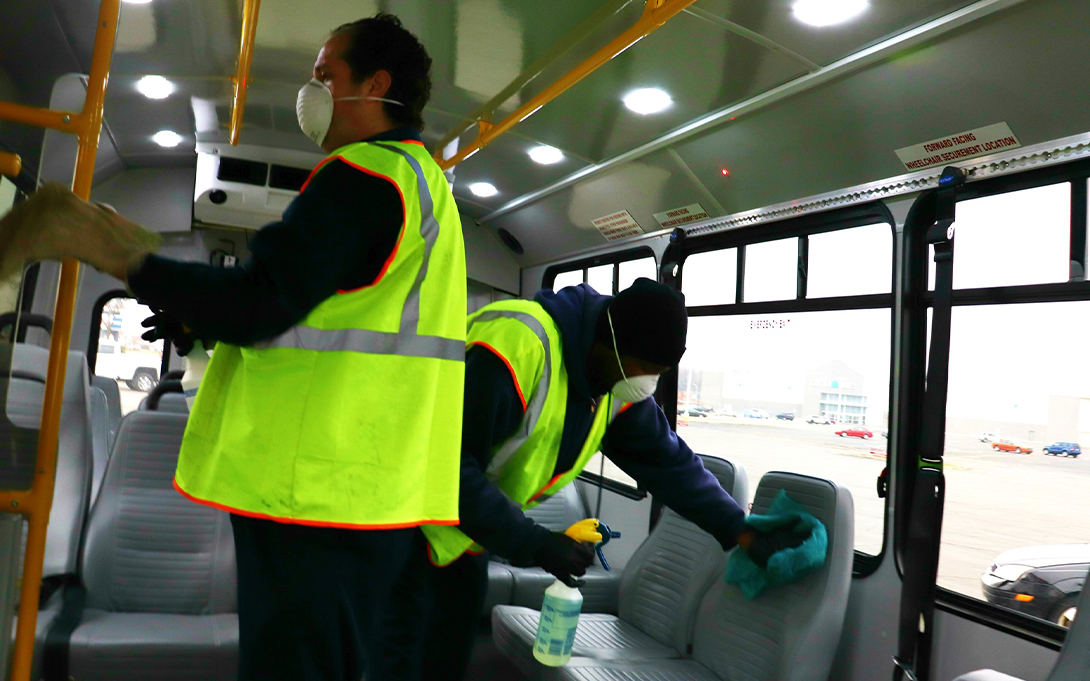
Ford School professor Robert Hampshire works at the intersection of public policy and engineering, with a specific focus on using better transportation systems to overcome inequities in society. Since early fall 2019, he and his colleagues had been working with the City of Detroit Office of Mobility Innovation to optimize the role of scooters in the transportation system as part of the Transportation Equity Open Knowledge Network (OKN). But as COVID-19 began to ravage the city in March, particularly impacting low-income families who must take additional risks to go to the grocery store, city leadership asked for help. As a result, Hampshire has broadened his work with the city and applied for and secured a National Science Foundation RAPID grant to address food insecurity.
“Low-income households have fewer options to secure food and other basic supplies without being exposed to the coronavirus. The reasons for food insecurity may vary - from students dependent on school lunch to seniors without smartphones or internet access to order delivery or use online payment systems,” Hampshire says. “Even though many schools tried to continue their school lunch programs during the school closures, students struggle to access those meals. Additionally, many families are cut off from food and grocery delivery services and are at higher risk for exposure due to more frequent trips to the grocery store, often by public transit.”
Through the NSF RAPID grant, Hampshire and his interdisciplinary research team will address food insecurity in Detroit and nationwide by:
-
Providing information and policy guidance to the City of Detroit’s pilot program to deliver school lunches to vulnerable families;
-
Identifying the geographical areas and people most affected by both food and transportation insecurity, in Detroit and nationwide; and
-
Developing a nationwide website and database that captures COVID-19 related food insecurity mitigation strategies and best practices.
Hampshire’s research team includes HV Jagadish, professor of Electrical Engineering and Computer Science and director of the Michigan Institute for Data Science, and Aditi Misra and Tayo Fabusuyi, colleagues from the University of Michigan Transportation Research Institute (UMTRI). He has also hired two recent Ford School MPP graduates to be the project manager and liaison to the City of Detroit.
Jagadish explains that in the face of a crisis, the reasons why people travel change, and it is in the public’s interest to look at these questions. “Often, decisions are driven by one system in focus. For example, a transportation engineer may seek to optimize a transportation service without asking why people travel from place to place,” said Jagadish. “But with this project, we are combining data that typically aren’t analyzed together to better support holistic decisions. With our partnership, we will be able to link available data on food security with information about when, where, how, and why people travel.”
With these insights, Hampshire and his team will have information to make evidence-based policy recommendations to address food insecurities and increase access to grocery stores. These recommendations might include redesigning bus routes and/or frequency of service, how scooter or bikeshare services could be modified to improve access, how existing city assets (e.g. shuttle vehicles) could be repurposed to complement bus service, and/or ways to improve school lunch delivery programs.
“Ultimately, we hope our work will help make vulnerable families in Detroit more resilient and inform future emergency food distribution programs for populations that do not have regular broadband internet or smartphones nationwide,” Hampshire explained.
Robert C. Hampshire is an associate professor of public policy at the Ford School, a research associate professor in both the U-M Transportation Research Institute's (UMTRI) Human Factors group and Michigan Institute for Data Science (MIDAS), and an affiliated faculty member in the Department of Industrial and Operations Engineering (IOE). He develops and applies operations research, data science, and systems approaches to public and private service industries. His research focuses on the management and policy analysis of emerging networked industries and innovative mobility services such as smart parking, connected vehicles, autonomous vehicles, ride-hailing, bike sharing, and car sharing. He has worked extensively with both public and private sector partners worldwide.
H. V. Jagadish is Bernard A Galler Collegiate Professor of Electrical Engineering and Computer Science at the University of Michigan in Ann Arbor. He is well known for his broad-ranging research on information management, and has approximately 200 major papers and 37 patents. He is a fellow of the ACM, “The First Society in Computing,” (since 2003) and serves on the board of the Computing Research Association (since 2009). He has been an Associate Editor for the ACM Transactions on Database Systems (1992-1995), Program Chair of the ACM SIGMOD annual conference (1996), Program Chair of the ISMB conference (2005), a trustee of the VLDB (Very Large DataBase) foundation (2004-2009), Founding Editor-in-Chief of the Proceedings of the VLDB Endowment (2008-2014), and Program Chair of the VLDB Conference (2014).Ê Since 2016, he is Editor of the Morgan & Claypool Synthesis Lecture Series on Data Management. Among his many awards, he won the ACM SIGMOD Contributions Award in 2013 and the David E Liddle Research Excellence Award (at the University of Michigan) in 2008.
The National Science Foundation is encouraging researchers to apply for RAPID grant funds for non-medical, non-clinical-care quick-response research that can be used immediately to address the COVID-19 global challenge.
